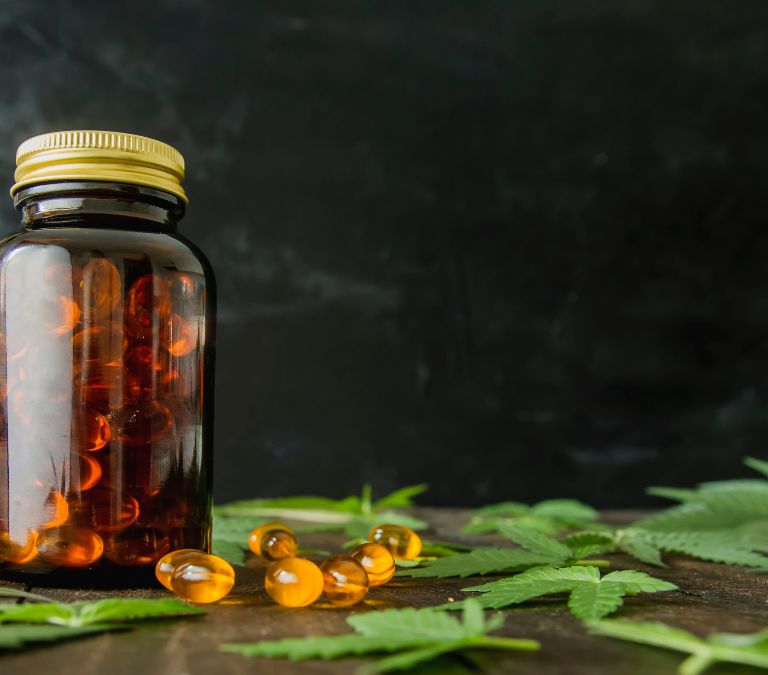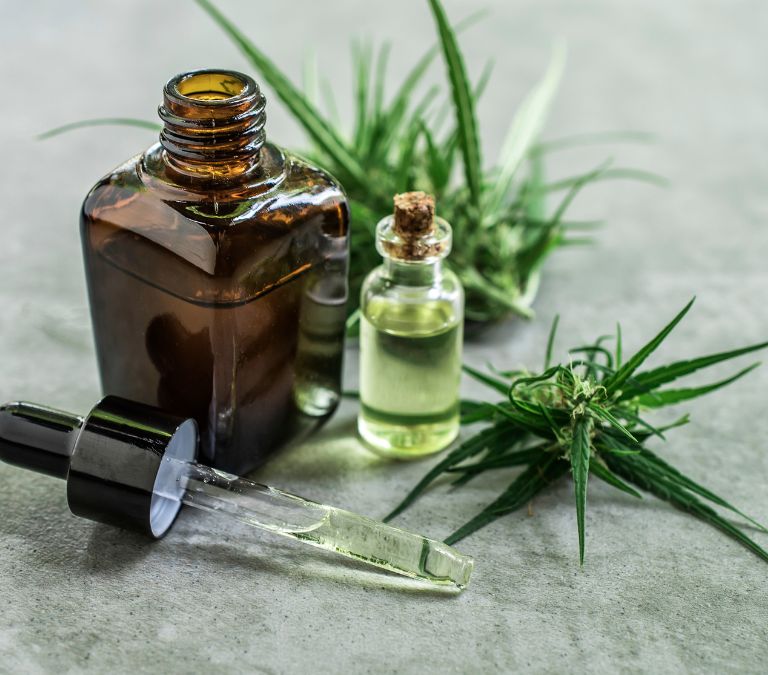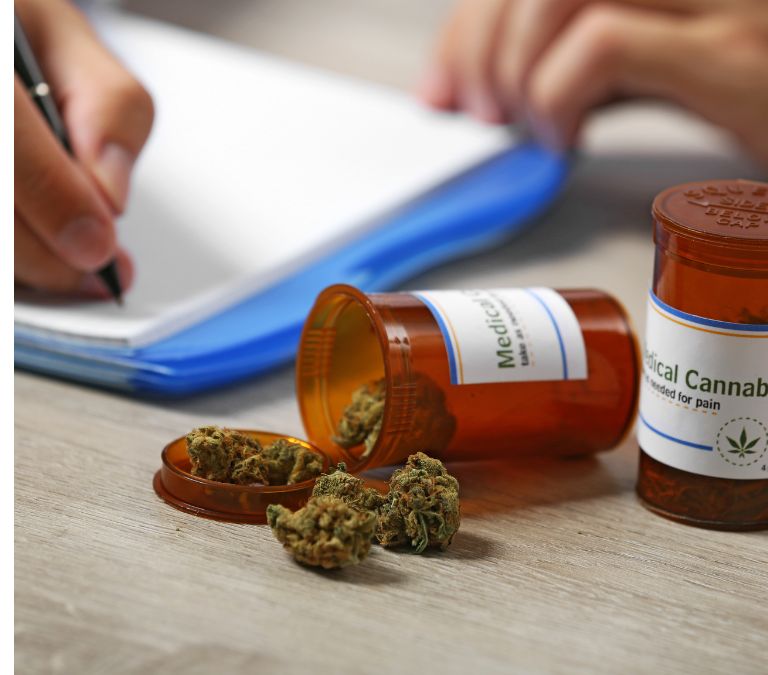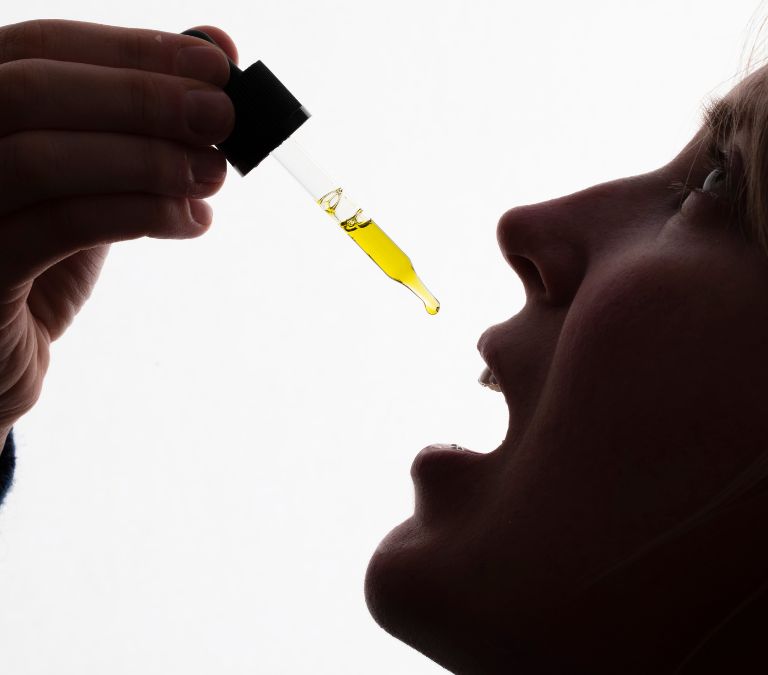Many women are now finding novel ways of managing their menopausal symptoms. Common menopausal symptoms such as vaginal dryness, painful sexual intercourse which is also known as Dyspareunia, sleeplessness, and hot flashes are now a thing of the past for some women who have discovered some unconventional means of keeping these signs at bay.
A study conducted in 2020 has revealed that about 27 percent of menopausal women have assuaged their raging hormones with cannabis.
The symptoms of menopause can be very discomforting and even depressing in some situations. However, women worldwide are discovering new solutions for managing these vasomotor symptoms. This and many other reasons is why there has been more research into using cannabis for menopause.
Some women have realized the soft power of some substances like cannabis. Many women testify to the ability of cannabis to provide relief from menopausal symptoms such as insomnia, hot flashes, dryness of the vagina, attendant pain, and frequent mood swings.
Indeed, many women have expressed satisfaction with the ability of cannabis to alleviate the harshness of their menopausal symptoms and provide lasting succor. There is a lack of scientific studies on the veracity of these claims and little information on how exactly it is used to contain these symptoms.
“The research we have about using cannabis, whether it’s marijuana or CBD, to help with menopausal symptoms is lacking,” said Dr. Jennifer Lincoln, author of the book “Let’s Talk About Down There: An OB-GYN Answers all Your Burning Questions … Without Making You Feel Embarrassed for Asking.” “Truly, we do need more research on cannabis and CBD.”
She explained that the US Food and Drug Administration recognizes cannabis as a ‘schedule one drug.’ It means that it has not been fully approved for medical use.
“It ties our hands and makes research very difficult,” she says.
However, the US Food and Drug Administration has other endorsed treatment methods. They include hormone replacement therapy which is effective against most vasomotor symptoms such as hot flashes and vaginal dryness.
There is, of course, the category of women who believe that vasomotor symptoms are merely due to normal aging. Thus they do not make any deliberate effort to find a solution to them.
Others may try to have a conversation about it but are usually met with indifference. This culture of silence and ignorance is one of the reasons at the root of cannabis use for treating menopausal symptoms.
Cultural Silence on Menopause as a Reason for Cannabis Use

There is a reason an increasing number of women are exploring cannabis as a treatment measure for menopause symptoms.
A 2020 research revealed that almost 27 percent of menopausal women used cannabis to calm their vasomotor symptoms. Ten percent were willing to try out cannabis as a treatment plan for their symptoms, while a meager 19 percent of the group examined employed traditional means of managing menopause.
“People going through menopause are left thinking, ‘Well, I don’t know where else to turn,’ so they try (cannabis),” Lincoln explained. “I feel for them because they feel like nobody’s listening to them.”
Dr. Lauren Streicher is the medical director of Northwestern Medicine Center for Sexual Medicine and Menopause. She has written quite a bit on menopause. She has a series of books about menopausal symptoms. In her latest work, “Hot Flash Hell,” a chapter is dedicated to showing women the ropes on how to utilize marijuana in the treatment of menopausal symptoms and scorching flashes.
“What we know is there are a lot of women who are using cannabis to alleviate menopause symptoms, and they have no direction at all,” said Streicher. “There’s not been a lot of research done.”
Using Cannabis For Menopause Symptoms – How It Works

Doctors like Dr. Lauren examine the works of other experts on the potency of cannabis and how it works. They also look at how it has been applied in other disease conditions and, with this knowledge, attempt to posit how menopausal women may use it.
“Any information I give is based on the science behind cannabis as opposed to (a study where) we took 1,000 menopausal women with hot flashes, and we gave half of the cannabis,” she said. “We don’t have those studies.”
Dr. Lauren has done some work by asking women questions to discover which of the Menopausal Symptoms incites them to try cannabis for treating or managing their condition. She speaks about the results she has gotten so far in her study:
“Overall, the two things people are using cannabis for are hot flashes and sleep, and, of course, they go together,” she said. “It’s the hot flashes that in the majority of cases are keeping women awake at night.”
She said that she has been looking to know if these women were advised or directed on the steps of using cannabis as a treatment method and what products to use.
“When I say, ‘Who directed you as to what to take?’ over 50 percent say, ‘Nobody. I was trying to figure it out on my own,’” she said. “Therein lies the problem.”
This lack of dosage or medical direction in these drugs poses a considerable risk to the health of any woman who uses cannabis.
For instance, edibles, a variety of drugs like cannabis, when taken, can stall for many hours before their effects begin to manifest. Due to the long period it takes to become effective, the user who does not get the expected results in a short time might decide to take a little more for good measure. It can lead to an overdose of the drug, which can have dire consequences.
On the flip side, it could happen that they do not take enough of the drug because they are too careful not to overdose or because they do not know for sure how their bodies respond to cannabis.
“No one is directing them to metabolize it far more slowly, which will impact not only what they should be taking, but how they take it and how much they take,” she said.
“That’s the direction I was trying to give in my chapter as best as I could to say, ‘OK, if you’re going to do this, I don’t want you to get in trouble.’”
What Caution Should be Taken in Using Cannabis for Menopause Symptoms treatment?
Doctors’ Advice is of Grave Importance
Experts agree on the need for menopausal women to consult with their doctors if they are taking or wish to start taking cannabis as a treatment measure for menopausal symptoms. Cannabis can react with certain medications that the doctor may recommend or any other medical treatment they are undergoing for menopausal symptoms.
“Please tell us,” Lincoln said. “We’re here to help you, and we’re not judging you when you tell us that you’re using this or that. It’s just like it is with any other supplement. It’s super important that we know what you’re on.”
Still, on this topic, Dr. Lauren remarked that there are some menopausal symptoms that women should, as a matter of grave importance, report to their doctor and refrain from trying to manage it themselves by using supplements or other drugs like cannabis.
“Any bleeding after you’ve officially gone through menopause we need to know about because you’re at high risk for uterus cancer,” Lincoln said. “It doesn’t mean that’s what it is. I don’t want to scare you away from getting treatment. But we need to check you out.”
Dr. Lauren laments the cultural silence about menopause as a significant reason for using unapproved treatment methods like cannabis to treat menopausal symptoms by women.
“Their doctors don’t bring it up. They don’t bring it up. And if they do bring it up, more often than not, women have a doctor who is not an expert,” she said. “You’re never done with menopause. You enter menopause, and you’re in menopause until you die.”
What is Cannabis?
Cannabis is a collection of three plants known for their psychoactive qualities. These plants are Cannabis Sativa, Cannabis Ruderalis as well as Cannabis Indica.
The plucked and dried flowers of these plants are used as drugs. Cannabis is a prevalent drug globally. Depending on the place, it goes by different names. Some famous names for cannabis are weed, marijuana, or pot.
While most of these pseudonyms are used for the primary reason of disguising the drugs because of their criminalized status in some countries, the original name, Cannabis, is fast gaining popularity in countries where the drug has been legalized.
The debate on the proper name to ascribe to the drug is multifaceted. It is argued in some quarters that the original title is maintained for accuracy and neutrality. Others kick against the other nicknames, for example, weed or pot, on the ground shrouded in illegality. The name marijuana has long been drowned out because of its racist origins.
What is Cannabis Used for?
The everyday use of cannabis is attributed to the ability of the drug to bring calm and feelings of relaxation to its users. Thus, it is commonly used to achieve those personal recreational purposes.
In some places where it is legalized, for instance, in some states of the United States of America, Cannabis is a prescription drug administered for the treatment of various medical issues such as glaucoma, loss of appetite, and relief for patients suffering acute pain.
The fact that the cannabis drug is from a plant and, as such, is natural or organic does not vitiate its ability to have potent effects on the user. These effects could be good or bad depending on the dosage used and how it is used.
What Constitutes Cannabis?
Cannabis contains over 120 different components. These components are called cannabinoids. There is no certainty as to what precisely these cannabinoids do. However, there is some information on cannabidiol (CBD) and tetrahydrocannabinol (THC).
Each of these cannabinoids is used for a different reason and affects the body differently from the others.
Cannabidiol (CBD): This cannabinoid can affect human behavior and the mind. Thus it is labeled as psychoactive. Despite its psychoactive quality, CBD does not intoxicate. In other words, you won’t get high from using it. It is popularly used to treat swelling and pain. Other uses of CBD include managing stomach distress, severe headaches, epileptic spells, and nervous disorders.
The first and only known prescription drug containing portions of CBD is Epidiolex. The Food and Drug Administration (FDA) in the United States of America has authorized this medication for the treatment of some varieties of epileptic spells or seizures.
More research is still underway to fully grasp the qualities of CBD and to explore its usefulness for medical treatments.
Tetrahydrocannabinol (THC): This constitutes the primary psychoactive compound in cannabis. THC is the component that gives the “high” that endears many people to Cannabis.
Most cannabis products may have only CBD or THC components in them. Yet, others may have both features combined in one product. The dried cannabis flowers used by many people have cannabinoids in them. However, certain kinds of flowers may contain more of one type of cannabinoid than the other. For instance, hemp is known to be fully packed with CBD while having no portions of THC.
What is the Immediate Effect of Cannabis?

Different results are obtained in a few moments after taking Cannabis. Most of these results last for a while, after which they subside, and you regain your state of mind and body before you use the drug.
While some of these results can be good for you, some can be a source of worry and concern.
The short-lived positive results of using Cannabis include:
- Having a feeling of relaxation or rest
- Euphoric or ‘high’ feeling
- Increased perception of how you see things around you
- Improvement in appetite
- Slightly mistaken perception of what time it is and what is going on around you
- Improved focus, imagination, and skill
Usually, these short-term effects are achieved more with products containing high quantities of THC and less with products with smaller portions of CBD.
In the same vein, you can experience some unfavorable impacts of the use of Cannabis within a short time after use. These disadvantageous effects last for a brief period, after which they dissipate, and you regain your original state before taking the product. They include:
- Inability to stay coordinated.
- Delay in reaction to stimuli
- Stomach distress
- Drowsiness and general weakness
- Nervous breakdown
- Excessively rapid heartbeat rate
- Low blood pressure
- Restlessness
As with the positive short-term effects, these adverse short-term effects of using cannabis are less likely to occur if you use products with more CBD components than THC components.
The mode of taking Cannabis also contributes to how your body will react to it in the short run. Smoking cannabis will give quick results in a matter of minutes. However, taking cannabis as a capsule or mixed with food may take hours before any effect is felt.
Long-term Effects of Cannabis Usage
The immediate effects of cannabis are not all the results you get from using this drug. There are undoubtedly long-lasting impacts of using cannabis. Because there is a disparity in the research findings on the long-term consequences of using cannabis, experts do not have a consensus on the long-term effects. In addition to this, most of the available findings are based on experiments carried out on animals. More extensive research on humans is necessary to understand the enduring consequences of using cannabis properly.
Some of the anticipated long-term effects of using cannabis include:
Development of the Brain
There have been studies that point to the possible effect of cannabis on the development of the brain in adolescent cannabis users.
These studies posit that people who start using cannabis from their teenage years are more likely to suffer learning and memory difficulties than those who did not. This research is, however, inconclusive on whether this effect is permanent.
People who begin from a very young age to take cannabis are also at a greater risk of suffering from severe mental health problems such as schizophrenia much later in their adult lives. However, experts have yet to confirm the integrity of this claim.
Addiction or Dependence
There has also been speculation on the probability of cannabis users becoming overly dependent and even addicted to cannabis in the long run. There are also complaints about severe or slight side effects that affect some people when they discontinue the use of cannabis or products containing cannabis. Such side effects range from migraines to changes in mood and demeanor, general irritability, and loss of appetite.
The National Institute on Drug Abuse stated that there are four to seven times higher chances of coming down with disorders emanating from cannabis use for people who start using the drug very early in their lives (especially before they are 18 years of age) than those who put off using the drug till they are much older.
Respiratory Issues
Just like smoking tobacco, smoking cannabis is generally advised against. The famous warning: that smokers are liable to die young applies to smoking cannabis. Smoking cannabis has been associated with painful swelling and reactions in the respiratory airways.
There have been pointers to the contribution of cannabis smoking to the setting off or aggravation of conditions like bronchitis and chronic obstructive pulmonary disease (COPD). Unlike tobacco smoking, however, there has not been any concrete medically proven connection between cannabis smoking and lung cancer. There is, however, very little research on this topic.
Is it Legal to Use Cannabis?
Cannabis is increasingly gaining legal status in many countries and places globally. Many people in different parts of the world now use it for personal pleasure or medical purposes. For instance, some states in the United States of America have decriminalized the use of cannabis for the purposes mentioned earlier.
The cultivation and use of this plant as a drug and for other purposes are still criminalized in many places.
In some places, like some states of the US, cannabis is only allowed for medical use. On the whole, any form of cannabis is prohibited under United States Federal law.
With the favorable developments in the area of medical research on the benefits of cannabis in managing certain health conditions– such as the use of CBD in treating swelling and pain as well as managing epileptic spells– it is believed that the government will change its stance on the legal status of the plant and products containing it.
There are also variations in the law governing the legalization of different kinds of cannabis. For instance, while some countries approve the use of products with CBD components, others frown at the very mention of cannabis in any form whatsoever.
Before trying out cannabis, please find the exact laws concerning its use in your country and area to avoid being caught on the wrong side of the law.
How Effective is Cannabis for Menopause?
Principal investigator Carolyn Gibson, Ph.D., MPH, is a psychologist and health services researcher at the San Francisco Veterans Affairs (VA) Health Care System.
She started asking questions about cannabis, such as the one above, and seeking answers when she noticed increased press articles about menopausal symptoms treatment and management using cannabis on social media.
“As cannabis use becomes increasingly mainstream, many midlives and older women are interested in or using cannabis to help manage menopause symptoms,” Dr. Gibson said. “However, we had no data on actual numbers or if use is helping or harming women.”
The Midlife Women Veterans Health Survey provided data from selected sample groups. This health survey used observational research methodology to study women veterans aged 45 to 64 registered in VA health care all over Northern California. The study gathered data between March 2019 and May 2020.
According to the report, Cannabis use is more regularly reported among women experiencing hot flashes (67 percent vs. 50 percent for non-users of cannabis; P = 0.03) and night sweats (68 percent vs. 47 percent; P < 0 .01) in two weeks.
However, no discrepancies are noticed between the two research groups for other vasomotor symptoms.
“I was expecting some women to report cannabis use for menopause symptom management but was surprised to see a rate approaching 30%,” Dr. Gibson said.
“This is compared to 19% of women in the sample who reported menopausal hormone therapy use.”
Dr. Gibson was also looking to discover disparities such as the everyday use of cannabis among younger women for managing menopausal symptoms but found otherwise.
Unfortunately, the study was silent on the regularity of use and effectiveness of cannabis in vasomotor symptoms treatment and management.
“Patients may not always disclose cannabis use, especially in the VA health care system, where cannabis is considered illegal under federal guidelines, regardless of state laws,” Dr. Gibson said. “Providers should be aware that their perimenopausal and postmenopausal patients may be using cannabis to manage their menopause symptoms.”
There are still many grey areas on the advantages, disadvantages, and risks of using cannabis, especially for managing menopausal symptoms.
“However, existing evidence raises concerns about its impact on cognition, cardiovascular health, and mental health,” she said.
It is hoped that researchers will get answers to questions like what kind of cannabis products are effective for menopausal symptoms management, what are the statistics of women using them, what other symptoms can be treated with cannabis, and what the proper dosages should be.
“We also need to know whether our numbers would look the same outside of Northern California and how typical use patterns impact health and functioning among perimenopausal and postmenopausal women,” Dr. Gibson stated.
At the North American Menopause Society (NAMS) meeting held in 2020, researchers put forward findings to establish an increase in the desire for cannabis use for menopausal symptoms management.
Part of the findings was that of the Northern California study of midlife female veterans, which revealed that more women are shown to choose and use cannabis for relief from menopausal symptoms over traditional treatment methods such as hormone replacement therapy.
It found that 27 percent of the women studied actively used or used cannabis to manage menopausal symptoms such as hot flashes.
Only a meager 19 percent still used the conventional treatment methods such as estrogen replacement therapy.
About 10 percent of the subjects were reported to have indicated that they are interested in using cannabis to soothe their vasomotor symptoms.
Also, some of the women who were subjects of this research reported using different menopausal symptoms management methods, of which cannabis was one of them.
The Dangers of Using Cannabis for Menopause
Many women are uncertain whether to use or avoid cannabis to manage their menopausal symptoms. This uncertainty and reluctance are fuelled by reports by health organizations like the Center for Disease Control and Prevention (CDC) pointing to the adverse effects of cannabis use on cognitive skills, decision-making skills, and memory in the long and short-run, as well as the higher probability of women suffering these side effects.
In experts’ opinion, taking the right amount or dosage is vital. Milder varieties of cannabis components such as CBD are advisable for menopausal women to minimize the adverse side effects.
Conclusion
Cannabis is another name for weed or pot, or marijuana. Whatever name you ascribe to it, the effects are the same. The impacts of cannabis use can be measured in the long and short term and can be positive and negative.
Being sure of the legal status of cannabis in your area is an essential prerequisite to using cannabis.
Next up, if it is legal to use cannabis in your area, speak with your medical practitioner for advice on your medical worthiness to use it. Considering your medical history, your doctor would know if cannabis may conflict or react with some other medications or are dangerous for you. Your doctor will also inform you of the gains and dangers of using cannabis and help you decide whether or not to use it.
There is a massive vacuum in research and literature concerning the use of cannabis to manage menopausal symptoms. Research needs to be conducted to answer the pressing questions about this topic and lift the veil of uncertainty shrouding the integrity of the effective use of cannabis to relieve menopausal symptoms.







